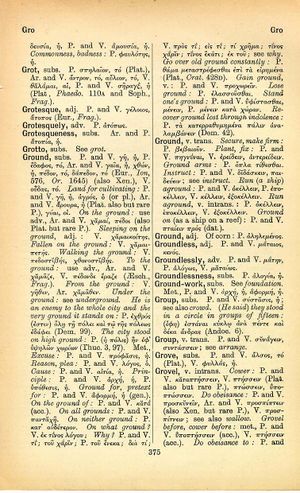ground: Difference between revisions
πρῶτον μὲν οὖν ὄστρεια παρὰ Νηρεῖ τινι ἰδὼν γέροντι φυκί ἠμφιεσμένα ἔλαβον ἐχίνους τ' ἐστὶ γὰρ προοίμιον δείπνου χαριέντως ταῦτα πεπρυτανευμένου → So first I spotted oysters wrapped in seaweed at the shop of some old Nereus, and sea urchins, which I bought; these were the appetizers for a delightfully managed dinner
(CSV4) |
m (Text replacement - "<b class="b2">Frag.</b>" to "''Frag.''") |
||
| Line 7: | Line 7: | ||
<b class="b2">Fallen on the ground</b>: V. [[χαμαιπετής]]. | <b class="b2">Fallen on the ground</b>: V. [[χαμαιπετής]]. | ||
<b class="b2">Walking the ground</b>: V. [[πεδοστιβής]], [[χθονοστιβής]]. | <b class="b2">Walking the ground</b>: V. [[πεδοστιβής]], [[χθονοστιβής]]. | ||
<b class="b2">To the ground</b>: use adv., Ar. and V. [[χαμᾶζε]], V. [[πέδονδε]] ἔραζε (Aesch., | <b class="b2">To the ground</b>: use adv., Ar. and V. [[χαμᾶζε]], V. [[πέδονδε]] ἔραζε (Aesch., ''Frag.''). | ||
<b class="b2">From the ground</b>: V. [[γῆθεν]], Ar. [[χαμᾶθεν]]. | <b class="b2">From the ground</b>: V. [[γῆθεν]], Ar. [[χαμᾶθεν]]. | ||
<b class="b2">Under the ground</b>: see [[underground]]. | <b class="b2">Under the ground</b>: see [[underground]]. | ||
Revision as of 11:00, 7 August 2017
English > Greek (Woodhouse)
subs.
P. and V. γῆ, ἡ, P. ἔδαφος, τό, Ar. and V. γαῖα, ἡ, χθών, ἡ, πέδον, τό, δάπεδον, τό (Eur., Ion, 576, Or. 1645) (also Xen.), V. οὖδας, τό. Land for cultivating: P. and V. γῆ, ἡ, ἀγρός, ὁ (or pl.), Ar. and V. ἄρουρα, ἡ (Plat. also but rare P.), γύαι, οἱ. On the ground: use adv., Ar. and V. χαμαί, πέδοι (also Plat. but rare P.). Sleeping on the ground, adj.: V. χαμαικοίτης, Fallen on the ground: V. χαμαιπετής. Walking the ground: V. πεδοστιβής, χθονοστιβής. To the ground: use adv., Ar. and V. χαμᾶζε, V. πέδονδε ἔραζε (Aesch., Frag.). From the ground: V. γῆθεν, Ar. χαμᾶθεν. Under the ground: see underground. He is an enemy to the whole city and the very ground it stands on: P. ἐχθρός (ἐστιν) ὅλῃ τῇ πόλει καὶ τῷ τῆς πόλεως ἐδάφει (Dem. 99). The city stood on high ground: P. (ἡ πόλις) ἦν ἐφʼ ὑψηλῶν χωρίων (Thuc. 3, 97). Met., Excuse: P. and V. πρόφασις, ἡ. Reason, plea: P. and V. λόγος, ὁ. Cause: P. and V. αἰτία, ἡ. Principle: P. and V. ἀρχή, ἡ, P. ὑπόθεσις, ἡ. Ground for, pretext for: P. and V. ἀφορμή, ἡ (gen.). On the ground of: P. and V. κατά (acc.). On all grounds: P. and V. πανταχῆ. On neither ground: P. κατʼ οὐδέτερον. On what ground? V. ἐκ τίνος λόγου; Why? P. and V. τί; τοῦ χάριν; P. τοῦ ἕνεκα; διὰ τί; V. πρὸς τί; εἰς τί; τί χρῆμα; τίνος χάριν; τίνος ἕκατι; ἐκ τοῦ; see why. Go over old ground constantly: P. θάμα μεταστρέφεσθαι ἐπὶ τὰ εἰρημένα (Plat., Crat. 428D). Gain ground, v.: P. and V. προχωρεῖν. Lose ground: P. ἐλασσοῦσθαι. Stand one's ground: P. and V. ὑφίστασθαι, μένειν, P. μένειν κατὰ χώραν. Recover ground lost through indolence: P. τὰ κατερρᾳθυμημένα πάλιν ἀναλαμβάνειν (Dem. 42). v. trans. Secure, make firm: P. βεβαιοῦν. Plant, fix: P. and V. πηγνύναι, V. ἐρείδειν, ἀντερείδειν. Ground arms: P. ὅπλα τίθεσθαι. Instruct: P. and V. διδάσκειν, παιδεύειν; see instruct. Run (a ship) aground: P. and V. ὀκέλλειν, P. ἐποκέλλειν, V. κέλλειν, ἐξοκέλλειν. Run aground, v. intrans.: P. ὀκέλλειν, ἐποκέλλειν, V. ἐξοκέλλειν. Ground on (as a ship on a reef): P. and V. πταίειν πρός (dat.). adj. Of corn: P. ἀληλεμένος.

